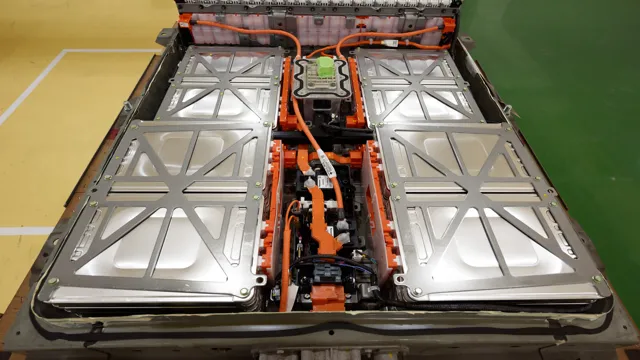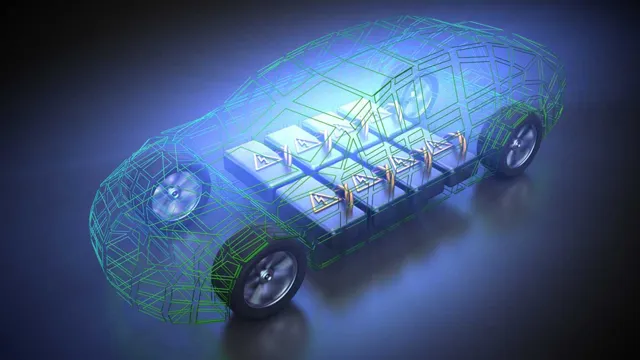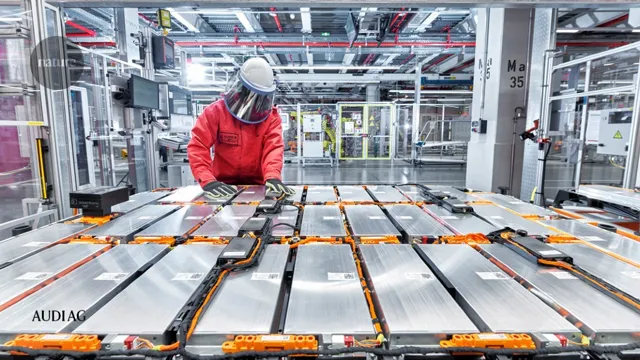Revolutionizing the Road: The Latest Innovations in Electric Car Batteries for 2019
Electric car batteries are constantly improving, making electric vehicles (EVs) a more attractive option than ever before. With advances in technology and growing consumer demand, EV manufacturers are working tirelessly to create batteries that offer better performance, longer range, faster charging times, and increased sustainability. In 2019, we saw some exciting developments in the world of electric car batteries that suggest even greater progress in the years to come.
One of the most notable advancements was the development of solid-state batteries, which offer higher energy density and better safety than traditional lithium-ion batteries. Major companies like Toyota and BMW have already invested heavily in this technology and are working to bring it to market in the near future. Other notable developments include Tesla’s continued focus on improving battery performance and range with its Model 3, and the use of recycled materials in EV batteries to reduce waste and improve sustainability.
As the world moves towards a more sustainable future, electric car batteries are playing an increasingly important role. As their performance continues to improve, we can expect to see more and more people making the switch to electric vehicles, further reducing our reliance on fossil fuels and helping to combat climate change. Needless to say, the future looks bright for electric car batteries and the EV market as a whole.
Current State
In 2019, electric car batteries have made significant progress with innovation, efficiency, durability, and safety in mind. Leading companies such as Tesla, Nissan, and GM are offering electric cars with high-capacity battery packs that have an extended range per charge. Tesla’s Model S has a range up to 370 miles, and Nissan Leaf has an EPA-estimated range of up to 226 miles.
The latest technology of battery cells is manufactured with a better chemistry of cathode materials, which allows more energy storage and faster charging. The battery’s thermal management systems have improved to ensure safety, prevent overheating, and extend battery life. Additionally, the cost of electric car batteries has reduced significantly, making electric vehicles cheaper and more accessible to consumers.
Furthermore, a high demand for electric cars has forced car manufacturers to collaborate with battery manufacturers, pushing research and development to produce better and more durable battery technology. As a result, electric car batteries are becoming increasingly efficient and cost-effective, making them a valuable alternative for people looking to adopt eco-friendly transportation.
Market Share of Major Brands
Market Share of Major Brands: Current State When it comes to the market share of major brands, there are a handful of players that dominate the scene. In the tech industry, companies like Apple, Samsung, and Google are continually battling for the top spot. Currently, Apple holds the top spot in the smartphone market with a whopping 39% market share, followed by Samsung with 22%.
Meanwhile, Google’s Android operating system has a majority market share of 72% in the mobile operating system space. In terms of e-commerce, no one can compete with Amazon, which holds a staggering 37% of the entire e-commerce market.
While these brands are undoubtedly dominant, it’s fascinating to see how the market share can shift rapidly based on consumer preferences and market trends. As consumers continue to lean towards sustainable and socially responsible brands, we may see a shift in the market share towards companies that prioritize these values.

Battery Capacity & Range of Popular Models
Battery capacity and range are key factors to consider when choosing an electric vehicle (EV). As of now, popular EV models offer different battery capacities and ranges that determine their usability. The Tesla Model S offers a top range of around 400-500 miles, one of the longest ranges among EVs.
On the other hand, the Nissan Leaf has a range of about 150 miles. The Audi e-tron has a range of around 222 miles. The Porsche Taycan is said to have a range of about 200-220 miles, while the Ford Mustang Mach-E comes in at around 230 miles.
As battery technology improves, the ranges of EVs are expected to increase, making them more appealing to consumers who have range anxiety. It is also crucial to consider the charging infrastructure in your area before purchasing an EV.
Technological Advances
Electric car batteries have come a long way in 2019, with new technological advances making them more efficient and cost-effective. One major development is the use of solid-state batteries, which use a solid electrolyte instead of the traditional liquid electrolyte. These batteries are safer, more durable, and can hold a charge for longer periods of time.
Another breakthrough is the use of silicon anodes, which allow for higher energy density and faster charging times. Additionally, manufacturers are beginning to use recycled materials in the production of electric car batteries, reducing waste and making them more sustainable. As electric vehicles become more mainstream, it’s exciting to see the evolution of the technology behind their batteries.
With continued research and innovation, the benefits of electric cars will only continue to grow.
Solid State Batteries
Solid State Batteries Solid state batteries are an exciting new development in the world of battery technology. Unlike traditional batteries, which use liquid electrolytes, solid state batteries use a solid electrolyte, which has a number of advantages. One of the biggest advantages is that solid state batteries can be much safer than traditional batteries.
Because there is no liquid electrolyte, there is less risk of leakage or fire. Another advantage is that solid state batteries can be smaller and more energy dense than traditional batteries. This is because the solid electrolyte allows for more efficient ion transfer, which means more energy can be stored in a smaller space.
As research into solid state batteries continues, we can expect to see even more advances in this exciting field.
Fast Charging Technology
Fast Charging Technology Technological advances have transformed the way we charge our devices. Fast charging technology has revolutionized the tech industry, delivering high-speed charging to our smartphones, computers, and other devices. With this innovative technology, you can charge your device in a matter of minutes, saving you time and hassle.
These chargers can deliver a high voltage and amperage to give your device a quick energy boost. Some newer smartphones even come with fast chargers that can charge your phone up to 50% in just 15 minutes. This is made possible through the use of enhanced circuitry and specialized chargers that provide higher levels of current.
While some might worry that fast charging could damage devices, these chargers are equipped with safety mechanisms to protect your device from overheating. Fast charging technology has made our lives more convenient and efficient, giving us more time to enjoy our favorite activities.
Improved Energy Density
Improved energy density is a critical factor in the development of efficient energy storage solutions, and technological advances have made it possible to achieve much higher energy densities than ever before. For instance, lithium-ion batteries have made significant strides in the energy density department over the past decade, thanks to ongoing research and development. The expansion of electric vehicles, mobile devices, and renewable energy sources has fueled this progress, leading to the development of more advanced battery technologies.
Technological advancements such as the use of new materials, 3D printing technology, and nanotechnology have all played a role in improving energy density. With these developments, we can look forward to even more efficient energy storage solutions that will help pave the way for a cleaner, greener future.
Economic Impact
As the demand for electric cars continues to grow, the production of electric car batteries is experiencing a surge in economic impact in 201 Consumers are becoming more environmentally conscious, and governments around the world are implementing policies to promote the adoption of electric cars. As a result, this creates a ripple effect in the industry of battery manufacturing for electric cars, with companies investing heavily in R&D, production, and distribution.
This in turn increases job opportunities and stimulates economic growth. The lithium-ion batteries used in electric cars are not only eco-friendly but also last longer than conventional car batteries, minimizing the need for frequent replacements. This means that consumers can save more money in the long run and driving an electric car becomes more affordable.
Additionally, the advancements in electric car battery technology could potentially lead to a shift towards a more sustainable future. This makes the economic impact of electric car batteries immensely significant both in the short and long term.
Cost Analysis of Electric Car Batteries
The economic impact of electric car batteries has been a topic of much debate among policymakers, industry experts, and consumers alike. While the initial cost of an electric car battery may be higher compared to the traditional gasoline engine, the long-term cost savings are significant. With improvements in technology, the price of electric car batteries has been decreasing over the years.
As a result, more consumers are opting for electric vehicles. Electric car batteries also have a longer lifespan than traditional car batteries, reducing the frequency and cost of replacements. Additionally, the adoption of electric vehicles has the potential to reduce dependence on foreign oil, creating new jobs in the domestic renewable energy industry.
In summary, while electric car batteries may have a higher upfront cost, the long-term economic and environmental benefits make them a wise investment.
Projected Growth in the Industry
One of the most significant economic impacts of the projected growth in the industry is job creation. As the industry expands, more jobs will become available in various fields, from manufacturing to research and development. This growth will lead to increased employment opportunities, which can generate significant economic benefits for communities.
Additionally, the industry’s growth can have positive effects on related businesses, such as transportation and logistics companies and packaging manufacturers. Local businesses may also experience a surge in growth as consumers demand more products and services. It’s essential to note that this growth is not limited to large corporations, but small businesses may also benefit as the industry expands.
Communities that embrace this growth can see significant increases in their economy, benefiting everyone from workers and business owners to local government agencies and residents. As such, the projected growth in the industry is bound to have a positive effect on the economy as a whole.
Future of Electric Car Batteries
Electric car batteries in 2019 are continuing to evolve and improve. Advances in technology have allowed for longer battery life, faster charging times, and greater energy density. Tesla, for example, is in the process of developing a battery that could power a car for over 500 miles on a single charge, while also offering a 0-60 acceleration time of under 2 seconds.
This level of performance will not only satisfy the needs of most consumers but will also help to eliminate concerns over “range anxiety.” Furthermore, electric car batteries in 2019 are becoming more environmentally friendly with the use of alternative materials such as sodium-ion and solid-state batteries. With these advancements, it seems that electric car batteries are poised to play a key role in the transition towards a sustainable transportation future.
Conclusion
In 2019, electric car batteries continue to be a hot topic among car manufacturers and environmentally-conscious consumers alike. As technology advances and prices drop, the future of transportation is looking increasingly electrifying. So, don’t wait until you’re running on empty to switch to an electric car.
Join the trend and let your ride electrify your life!”
FAQs
What advancements were made in electric car battery technology in 2019?
In 2019, there were several advancements made in electric car battery technology such as improved energy density, longer life cycles, and faster charging times.
How much does it cost to replace an electric car battery in 2019?
The cost to replace an electric car battery in 2019 varies depending on the make and model of the vehicle, but on average it can cost anywhere from $3,000 to $10,000.
What is the range of electric car batteries in 2019?
The range of electric car batteries in 2019 varies depending on the make and model of the vehicle, but on average they can travel anywhere from 100 to 300 miles per charge.
Are there any eco-friendly options for disposing of electric car batteries in 2019?
Yes, there are several options for eco-friendly disposal of electric car batteries in 2019 such as recycling the materials for future use or repurposing them for energy storage systems.






